- Home
- Michael Scott
The Nameless City
The Nameless City Read online
THE NAMELESS CITY
Michael Scott
PUFFIN
Contents
About Michael Scott
Books by Michael Scott
THE NAMELESS CITY
Copyright page
About Michael Scott
Michael Scott (@flamelauthor) is one of Ireland’s most successful and prolific writers for both children and adults. Michael has over 100 titles to his credit and has written in a variety of genres including fantasy, science fiction and horror, and is considered an authority on mythology and folklore. In 2007, The Alchemyst: The Secrets of the Immortal Nicholas Flamel, the first in a ground-breaking young adult fantasy series, launched straight into the New York Times bestsellers list, spending sixteen weeks in the top ten. All six books in the series have been New York Times bestsellers and the series is now published in thirty-seven countries. He lives in Dublin.
Find out more about Michael at www.dillonscott.com. You can also follow him on Twitter: twitter.com/flamelauthor
Books by Michael Scott
The Secrets of the Immortal Nicholas Flamel series:
The Alchemyst
The Magician
The Sorceress
The Necromancer
The Warlock
The Enchantress
Prologue
We are old now.
Our age is not measured in centuries or millennia or even aeons.
We have seen the rise and fall of solar systems. We have observed galaxies spin and turn, and, once, we watched the entire universe die, only to be instantly reborn in music and light.
Before the Doctor, before the Master, before Gallifrey and the Time Lords, our race ruled the universe. Gone now. All gone. Just we few remain.
But while the rest of our race faded, their atoms mixed amongst the stars, we clung to a semblance of life, dancing to the Music of the Spheres. Our rage kept us in existence, and our loathing sustained us. We will have our revenge. We will rule again.
We are the Devourers of Worlds, the last of the Old Ones.
We are the Archons.
Decrypted data burst recovered from the TARDIS records.
1
London, 1968
A shout: high-pitched, terrified.
The sound was nearly lost in the noise of the busy Saturday-afternoon traffic and the crowds bustling along Charing Cross Road. A few people glanced up and looked around. Seeing nothing wrong, they went on their way.
A second shout rang out, almost completely drowned by the blare of car horns.
Only a tall dark-haired young man standing outside a shabby antiquarian bookshop continued to look, head tilted to one side, eyes half closed, listening intently. None of the passers-by paid him any attention and, since this was London and the city was awash with the latest fashions, no one even blinked at his oversized black turtleneck sweater or the fact that he was wearing a red Scottish-tartan kilt, complete with sporran.
The young man used a trick his father had taught him when they’d been hunting grouse in the Highlands. He deliberately focused on the sounds – first, the cars and buses; next, the street clatter, the dull hum of shouts, the buzz of laughter – and then he tuned them out. He waited for something out of the ordinary, something odd, alien. Something like …
The slap of leather on stone.
It had come from behind him.
Moving quickly now, he followed the sound. It led him to the mouth of a cobbled alley. He glanced down: it was empty. However, he knew with absolute certainty that this narrow tube of stone would have carried any sounds out into the street beyond. Ducking into the alleyway, he blinked, allowing his eyes to adjust to the gloom, before darting forward. The alley curved slightly to the left and as he rounded the corner he discovered the source of the noise.
A bearded grey-haired man lay sprawled across the filthy stones, surrounded by a scatter of antique leather-bound books. An enormous greasy-haired thug crouched over the figure, searching through a battered satchel, pulling out books and tossing them to one side.
‘Please … please be careful,’ the old man groaned as each leather-clad volume hit the ground with a distinctive slap.
‘Where’s the money?’ the huge thug snarled. ‘Where’s the shop’s takings?’
‘There is none …’ the old man said quickly. ‘We sell antiquarian books. But some days we don’t sell anything …’
‘I don’t believe you. Empty your pockets.’
‘No,’ the old man said defiantly.
‘Yes!’ The thief smiled, thin lips peeling back from yellowed teeth.
Anger flashed in the young Scotsman’s eyes. He knew he shouldn’t get involved. He’d been entrusted with a critical mission and had promised not to delay, but he’d also been raised to a strict code of honour, which included protecting the weak and respecting elders. Keeping close to the walls, he hurried forward, well-worn soft-leather-soled shoes making no sound on the cobblestones.
‘I said, Empty your pockets.’ The thug tossed the satchel to one side and loomed over the man lying on the ground.
Suddenly, a shout cut through the air: a guttural snarl that shocked the thief into immobility. He caught a glimpse of a shadow in the corner of his eye the instant before a tremendous blow to his side sent him crashing into the alley wall. His head cracked against the old stones, and red and blue spots of cold light danced before his eyes as he sank to his knees. The thief blinked, watching a figure in a red skirt – no, a kilt – swim into focus. Scrambling to his feet, he threw an unsteady punch and then something hit him in the centre of the chest and he sat down hard, spine jarring on the cobbles.
‘If you know what’s good for you, you’ll run away now. And you won’t look back.’ Although the Scotsman had spoken in little more than a whisper, the threat was clear.
Bending double, with both arms wrapped round his bruised chest, the thief backed away, then turned and ran.
The Scotsman knelt, offering his hand to the old man and gently easing him into a sitting position. ‘Are you hurt?’
‘Only my pride … and my trousers.’ The grey-haired man struggled slowly to his feet, brushing his hair back off his high forehead. ‘And my poor books.’ He moved to pick them up, but the Scotsman was already darting around, collecting the scattered volumes. ‘You’re very brave,’ the man said, his deep voice echoing off the alley walls.
‘Well, I couldn’t just walk away, now could I?’
‘Yes, you could have. Others did.’ The older man stuck out a leather-gloved hand. ‘Thank you, thank you very much.’ He smiled through a neat, grey-flecked goatee beard, his eyes dark and curious beneath heavy brows. ‘I’m Professor Thascalos.’
‘I’m Jamie, Jamie McCrimmon.’
‘Scottish. I thought I recognised a Gaelic war cry. Creag an tuire. What is that – “The Boar’s Rock”?’
Jamie handed over the books. ‘You mean the kilt wasn’t a clue?’ he asked with a grin.
The old man smiled. ‘Fashions nowadays.’ He shrugged. ‘Who knows what you young people are wearing?’
Jamie picked up the satchel and held it open as the professor carefully brushed off each book and returned it to the bag. Some of the leather bindings had been scuffed and torn when they’d hit the cobbles and one cover had come away entirely. ‘You were in the military?’ the professor asked.
Jamie shook his head. ‘Not really.’
‘You reacted like a soldier,’ Professor Thascalos said. ‘A shout at the last minute to disorientate the enemy, followed by an overwhelming attack. That only comes with experience. You’ve been in battle.’
The young Scotsman nodded slightly. ‘Aye, well, it was a long time ago,’ he said, his accent suddenly pronounced. ‘And it didn’t
end well.’ He wasn’t going to tell the professor that the last battle he’d been in had taken place over two hundred and twenty years ago. He handed the final book to the professor. ‘Is there much damage?’
‘I can have the worst ones re-bound. I should not have come down this alleyway, but I was taking a short cut to my shop. I’m a bookseller on Charing Cross Road,’ he added, and then lifted the bag of books. ‘But you probably guessed that.’
‘I did.’ Jamie grinned. ‘Will you report this to the police?’
‘Of course.’
‘If you’re all right then, I’ll be on my way.’
The professor reached into an inside pocket and pulled out a wallet. ‘Here, let me give you something –’ He stopped suddenly, seeing the look on Jamie’s face. ‘Not money then, but here …’ Rummaging in the bag, he found a small book, wrapped in a black silk handkerchief.
‘I don’t want payment …’
‘Not payment – a gift,’ the bookseller said. ‘A thank-you.’ He handed the package to Jamie, who took it and turned it round in his large hands, folding back the silk to trace a curling outline embossed into the book’s dark leather cover.
‘It looks old.’
‘It is. It is one of the oldest books I possess.’
Jamie opened it. The thick pages were covered in blocky black print in a language he thought might be German. ‘It must be very valuable.’
‘It is,’ the professor repeated, ‘but I want you to have it. You saved my life today, young man,’ he said gruffly. ‘It is the least I can give you.’
‘I cannot read the writing.’
‘There are few who can. But keep it. I insist. You can always give it as a gift to someone you think might appreciate it.’ He suddenly reached out and shook Jamie’s hand. ‘Now I have delayed you and taken up far too much of your time. Thank you. You are a credit to your clan.’ The professor stood back and swung his satchel on to his shoulder, then turned and strode down the alley. He raised his gloved hand and his voice echoed off the stones. ‘Take care, Jamie McCrimmon,’ he called. ‘Enjoy your book.’ And then he rounded the corner and vanished.
Jamie looked at the black book, rubbing his thumbs over the surface. The leather felt oily and slightly damp. He guessed it had fallen in a puddle. Bringing it to his nose he breathed in slowly. He thought he smelled the faintest odour of fish and sea air from the pages. Shrugging, he wrapped it back in its silk and shoved it in his belt as he hurried away. Maybe the Doctor would like it.
Professor Thascalos paused at the end of the alley. He could hear Jamie’s footsteps fading away in the opposite direction. He turned his head to look at a huge figure lurking in the shadows. The greasy-haired thief stepped forward, mouth wide in a broad, gap-toothed grin.
‘You did well,’ the professor said quietly. He pulled out a wad of money from an inside pocket of his greatcoat. ‘We agreed on fifty, but here’s sixty.’ He peeled off six crisp ten-pound notes and handed them across. ‘A bonus for getting hit.’
The man looked at the thick bundle of notes and he licked his lips.
‘You’re thinking foolish thoughts now,’ the professor said quietly again, his face settling into an implacable mask. ‘Dangerously stupid thoughts,’ he added icily.
The thug looked into the professor’s dark eyes, and whatever he saw there made him step back in alarm. ‘Yes … yes, fifty. And the bonus. Very generous. Thank you.’
‘Good boy. Now, go away.’ The professor tossed the bag of books at the big man. ‘Here, get rid of these for me.’
‘I thought they were valuable.’
‘Only one,’ the professor muttered to himself, looking back down the alley. ‘And that was invaluable.’
Stepping into the shadows, the professor watched as the thief slid unnoticed into the throng of people walking past. Then he pulled a slender metal cylinder from his pocket, twisted it counter-clockwise and held it to his thin lips. ‘It is done,’ he said in a language that had not been heard on Earth since the fall of Atlantis. ‘I have completed my half of the bargain. I trust, when the time comes, you will honour your part.’
A thread of faint ethereal music hung on the air.
The professor snapped the cylinder closed and strode away, a rare smile on his lips.
2
There was a blue police box almost directly opposite the statue of Henry Irving at the back of the National Portrait Gallery. None of the tourists gave it a second glance, though a few of the local traders were a little bemused by its sudden appearance. It had recently been announced that London’s police boxes would soon be phased out and demolished.
Jamie McCrimmon slowed as he rounded the corner of the gallery and then stopped. There were tourists everywhere; some were even taking photographs using the blue box as a background. A family of what could only be American tourists in florid shirts, matching shorts and sandals was standing right up against the door.
‘Ah, there you are!’
Jamie whirled round.
The Doctor was standing behind him, looking his usual rumpled and dishevelled self. Polly, one of the Doctor’s companions who had known him before he’d changed, once described him as looking like an unmade bed. Jamie thought it was a good description. The Doctor’s mop of thick black hair was uncombed, his collar was rumpled and a bow tie sat slightly cock-eyed round his neck. He was wearing a black frock coat that had gone out of fashion decades ago over black-and-white checked trousers, which managed to be both too large and just a little too short. It was impossible to put an age on him: he looked to be in his mid-forties, but the Scotsman knew that the Doctor was at least five hundred years old. Jamie still hadn’t decided if he was a genius or a madman. Or both.
The Doctor was licking an ice-cream cone. ‘What kept you?’
‘There was a wee spot of bother …’ Jamie began.
‘Did you get everything on my list?’
‘Nothing,’ Jamie said ruefully. ‘I went to all the chemists I could find – none of them had even heard of the stuff on your list, except the gold and mercury.’
The Doctor bit off the top of the cone. ‘Then we have a problem,’ he said, frowning, deep lines etching into his face. ‘A serious problem.’
Jamie nodded towards the police box. ‘I know. How are we going to get inside?’
The Doctor silently handed Jamie the half-eaten cone. He reached into an inside pocket and pulled out a slender wooden recorder decorated in swirls of blue. ‘When I say run, run!’ he said. ‘Oh, and you might want to stick your fingers in your ears,’ he added, raising the recorder to his lips.
Even with his fingers jammed in his ears – and with cold ice cream dripping down the side of his neck from the cone clutched in one hand – Jamie could still hear the sound vibrating through the air. Pressure built up in his ears and all the nerves in his teeth protested. Birds nestling in the trees and pecking on the ground erupted into the air in an explosion of flapping wings.
‘Run!’ the Doctor instructed. He darted forward, head tilted towards the sky, finger pointing upwards. ‘What is that?’ he shouted. ‘There … just there.’
Everyone looked up, following the wheeling, darting birds.
The Doctor brushed past the staring tourists, stepped up to the police box and quickly unlocked it. He opened the door just wide enough to slip through and pushed it closed promptly after Jamie squeezed inside.
‘We don’t want anyone peeping in now, do we?’ The Doctor grinned and clapped his hands in delight. ‘See? Simplicity itself! There are very few things that a good diversion won’t solve.’
No matter how many times he travelled in the extraordinary machine, Jamie knew he would never get used to the idea that the Doctor’s ship – the TARDIS – was bigger on the inside than it appeared on the outside. He had no idea how many rooms, galleries, museums and libraries were housed in the extraordinary craft. There was even supposed to be an Olympic-sized swimming pool somewhere in the basement, but he’d never managed to find
it. Jamie stopped, suddenly conscious that the beautiful and ornate central console, which was at the heart of the machine, had been dismantled and lay strewn in pieces around the hexagonal room. The floor was scattered with coils of wire, glass panels and hundreds of oddly shaped cogs and wheels.
The Doctor tiptoed his way through the mess. ‘Touch nothing,’ he warned. ‘I know exactly where everything is.’ His foot struck a squat metal cylinder, sending it spinning into a little pyramid of ball bearings, which scattered in every direction, ricocheting around the room. ‘Well, almost everything.’
‘You can fix it, can’t you?’ Jamie said carefully. When he’d left a few hours earlier, the Doctor had been lying flat on his back, head buried under the central console, whistling softly to himself.
The Doctor stood in the centre of the mess and spread his arms wide. ‘Not this time. I’m afraid we’re stuck,’ he said ruefully. ‘The Time Rotor is damaged; I daren’t take us back into the time stream with it in its present condition.’
Jamie stepped over a coil of cable, which writhed on the floor trying to follow him. The Doctor had once told him that these ships were not made but grown, and were actually sentient in their own way. ‘Stuck. Now, when you say stuck …?’
‘As in stuck. Unable to move. Trapped.’ The Doctor’s humour changed in an instant. ‘Are you sure you couldn’t find anything on my list?’ he asked irritably.
‘Nothing,’ Jamie said. He carefully skirted round a wire honeycomb filled with tiny winking stones.
‘Can’t we buy the gold?’ enquired the Doctor absent-mindedly.
Jamie pulled the handwritten list out of his sleeve and unfolded it. ‘A ton of gold,’ he read. ‘Doctor, unless we rob the Bank of England, we’re never going to find a ton of gold. And, even if we bought it legally, it would cost a fortune. I checked this morning’s Financial Times. Gold is priced at around thirty-seven American dollars an ounce. I don’t know how many ounces there are in a ton …’

 The Warlock
The Warlock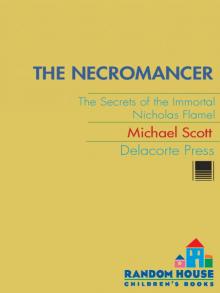 The Necromancer
The Necromancer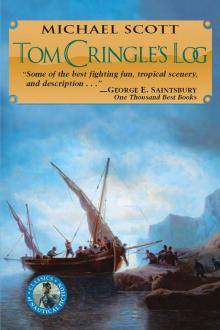 Tom Cringle's Log
Tom Cringle's Log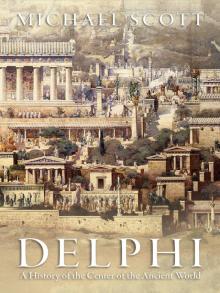 Delphi
Delphi The Magician
The Magician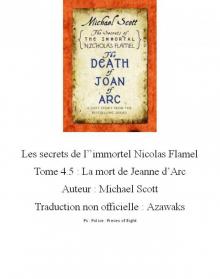 La mort de Jeanne d'Arc (trad. privee)
La mort de Jeanne d'Arc (trad. privee)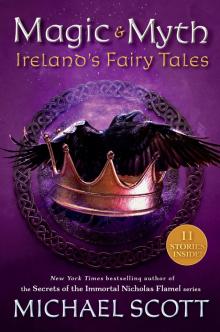 Magic and Myth
Magic and Myth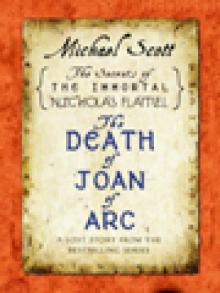 The Death of Joan of Arc
The Death of Joan of Arc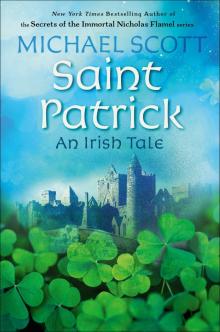 Saint Patrick
Saint Patrick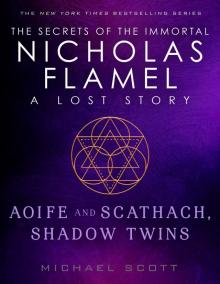 Aoife and Scathach, Shadow Twins
Aoife and Scathach, Shadow Twins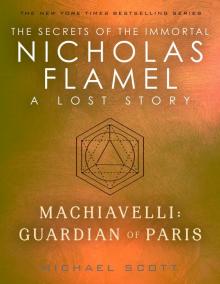 Machiavelli
Machiavelli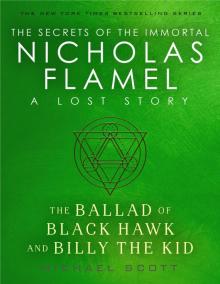 The Ballad of Black Hawk and Billy the Kid
The Ballad of Black Hawk and Billy the Kid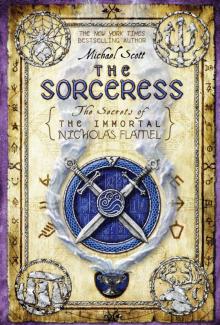 The Sorceress
The Sorceress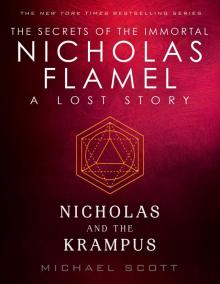 Nicholas and the Krampus
Nicholas and the Krampus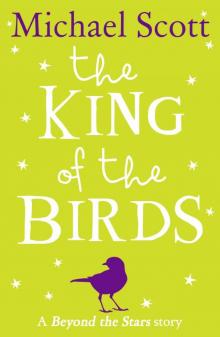 The King of the Birds
The King of the Birds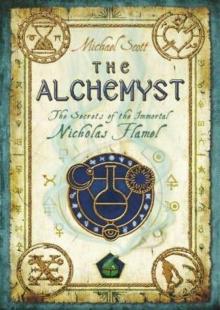 Nicholas Flamel 1 - The Alchemyst sotinf-1
Nicholas Flamel 1 - The Alchemyst sotinf-1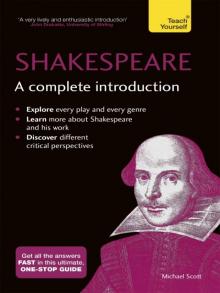 Shakespeare- a Complete Introduction
Shakespeare- a Complete Introduction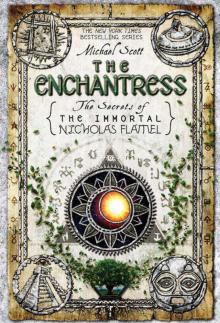 06 The Enchantress
06 The Enchantress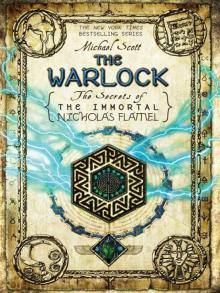 05 The Warlock
05 The Warlock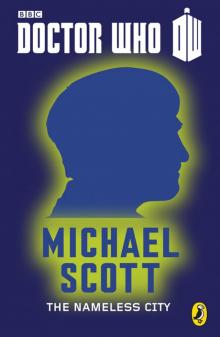 The Nameless City
The Nameless City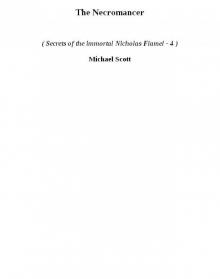 The Necromancer sotinf-4
The Necromancer sotinf-4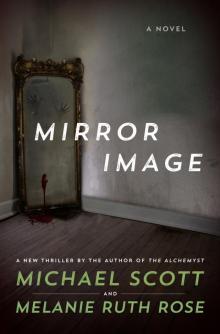 Mirror Image
Mirror Image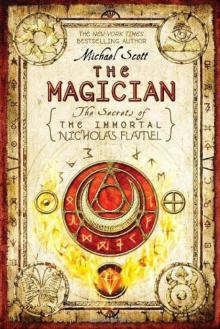 Nicholas Flamel 2 - The Magician sotinf-2
Nicholas Flamel 2 - The Magician sotinf-2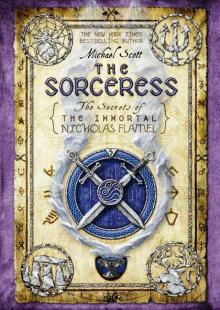 The Sorceress sotinf-3
The Sorceress sotinf-3